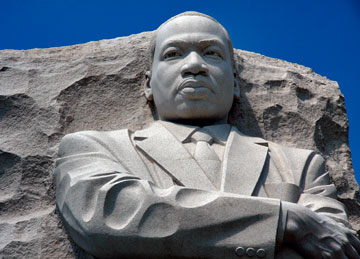Editor's Note: Each year, retired United Methodist Bishop Woodie W. White writes a “birthday letter” to the Rev. Martin Luther King Jr. in which he offers his perspective on the state of race relations, particularly in the United States. White, now bishop-in residence at Candler School of Theology at Emory University in Atlanta, was the first general secretary of the General Commission on Religion and Race of The United Methodist Church.
Dear Martin:
I wish this birthday letter might be more positive than the one I wrote last year. It is not! Our nation's racial climate has gotten worse rather than better! A political rhetoric of divisive and hate-filled speech pollutes the atmosphere. To our struggle against racism and its negative impact on American life and legacy is added growing xenophobia, nativism and even religious intolerance. Sadly, too many of our political and would-be political leaders are exploiting fears, prejudices and insecurities in the face of increased worldwide terrorism.
Lady Liberty in the harbor must find it difficult not to weep as she lifts her lamp beside the golden door and invites, “Give me your tired, your poor, your huddled masses yearning to breathe free. … “
Only last month, on Dec. 6, we marked the 150th anniversary of the ratification of the 13th amendment to the United States Constitution. This amendment, which declares slavery illegal in the nation, is a reminder both of the high cost of racism – and of the nation's efforts to correct its wrongs. America is still engaged in this effort, but there are those who remain committed to a racially and ethnically divided nation. They will fail!
I was hopeful that the emergence of the Idea "Black Lives Matter" might elevate both the conversation and the consciousness in our quest to address ongoing issues of race in America. The recent rash of deaths of unarmed, young black men in encounters with police provides the opportunity for renewed and serious engagement of our unfinished work as a nation. However, this is not the only indication that the nation needs to be reminded that "Black Lives Matter.”
Martin, your heart would break, as does mine, at the violent deaths of young black men in community after community. These deaths are becoming so commonplace that some communities seem resigned to them. They are a tragedy too little addressed.
Perhaps, to many in our nation, black and white, black lives really don't matter! Perhaps, what is more important is being elected to office or passing legislation that would seek to disenfranchise. Perhaps, it is being identified with symbols or signs or colors or territory! This is unacceptable for this nation and its people. It is especially unacceptable for people of a faith which teaches its young to sing, "Red and yellow, black and white, all are precious in his sight."
This leads me to my great disappointment -- the near silence of the churches in the recent racial discourse. I wait for some outcry of moral indignation at the racial climate in this country, some ethical compass for political and civic leaders, some call for racial unity, some serious challenge to the voices of hate!
Martin, I continue to read and appreciate your “Letter from a Birmingham Jail”, penned from your cell, on April 16, 1963. I believe it was your finest composition! You challenged church leaders of that day to confront the racial context in which they found themselves with more boldness and consistency. I commend its reading to today's leaders, who may have never read it. They will find it instructive as they confront injustice, prejudice and intolerance in today’s racial context.
While I write today with disappointment, it is not without hope.
Our friend and courageous leader the Rev. William Sloan Coffin wrote in 1994: "Hope is a state of mind independent of the state of the world. So, if your heart's full of hope, you can be persistent when you can't be optimistic. You can keep the faith despite the evidence, knowing that only in so doing has the evidence any chance of changing. So while I am not optimistic, I am always hopeful."
So, Martin, I close, if not with optimism, with hope!
Woodie
P.S.: Martin, after I ended these words to you, I completed reading a new book Born of Conviction. It was written by a native Mississippian Joseph T. Reiff. He details brilliantly the experience of 28 courageous white Methodist ministers, who, in 1963, sought to speak to the racial context of their day. They issued a statement titled “Born of Conviction.” It called for a non-segregated society and affirmed the value of a desegregated public school system. Sadly, they paid a high price for such courage. I was inspired by their witness and I needed to be reminded of such courage often so overlooked.
ADDITIONAL RESOURCES
A Letter to Martin Luther King Jr. - 2015
Widen the Circle: A Call to Beloved Community
Civil Rights Act, Freedom Summer anniversary brings reflection

